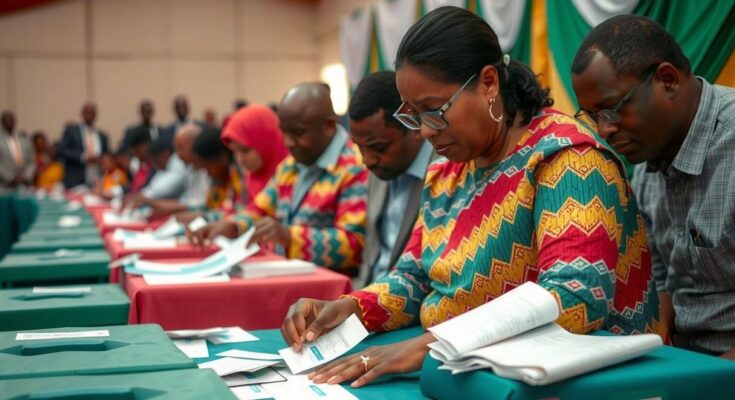Ghana conducted presidential and parliamentary elections on Saturday with hopes for economic recovery post-crisis. President Nana Akufo-Addo is stepping down, leaving a competitive race primarily between Vice President Mahamudu Bawumia and former President John Dramani Mahama. Initial reports indicate calm voting with high turnout and early results signaling a lead for Mahama’s party, though violence occurred in some areas. Final outcomes are anticipated by Tuesday.
On Saturday, Ghana held presidential and parliamentary elections amid hopes for an economic resurgence following a severe financial crisis that culminated in a significant debt default. President Nana Akufo-Addo will conclude his term next month, having served two constitutional terms. The election is primarily contested between Vice President Mahamudu Bawumia, the New Patriotic Party’s (NPP) candidate, and former President John Dramani Mahama of the National Democratic Congress (NDC). Polls indicate Mahama may be poised for a political comeback, using his prior presidency as a foundation for his campaign.
Bawumia, 61, asserts that a vote for him represents a continuation of progress, highlighting an economic growth rate of 6.9% year-on-year in the second quarter of 2024, the highest in five years. Both candidates reported a generally peaceful voting process, though isolated incidents of violence were recorded. Following the polls, with results still being counted, supporters from the NDC celebrated early indications of favorable outcomes. The Electoral Commission reported a high turnout, with voting materials distributed effectively across polling stations, although some disturbances were noted.
As the election unfolds, results are expected through Sunday night, with presidential outcomes likely to be determined by Tuesday. The nation awaits a decisive outcome in this pivotal election, which will shape Ghana’s future economic landscape.
The context of Ghana’s recent elections is rooted in a period of considerable economic turmoil that led to the nation seeking assistance from the International Monetary Fund (IMF). After experiencing the worst financial crisis in over a generation, Ghana’s electorate is particularly invested in the prospects for economic recovery. The election is crucial not only for leadership transition from President Nana Akufo-Addo but also for policies aimed at restoring fiscal stability and growth to the cocoa-producing and gold-mining nation.
The elections in Ghana mark a significant juncture as voters seek a pathway to economic recovery following recent hardships. With the race between Vice President Bawumia and former President Mahama intensifying, the outcome holds substantial implications for the country’s policy direction. Observations of a generally calm voting process give indications of a stable political environment, yet the potential for unrest remains as results are awaited. The next steps in this electoral journey will undoubtedly shape Ghana’s future.
Original Source: www.voanews.com




